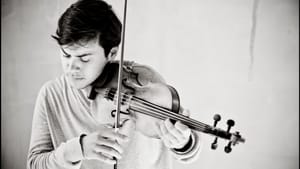Stay in the Loop
BSR publishes on a weekly schedule, with an email newsletter every Wednesday and Thursday morning. There’s no paywall, and subscribing is always free.
Ravishing Ravel, Prokofiev perfection
The Philadelphia Orchestra with guest violinist Benjamin Beilman

This Philadelphia Orchestra program promised to be a tasty little sandwich, with two sweet Ravel concoctions on either end and some spicy Russian dressing in the middle. The reality was nothing short of stunning, a program almost shocking in its engagement and brilliance.
On and offstage magic
True, the opening number, Le Tombeau de Couperin, is a light but satisfying salvo, four delightful movements unified by the clarion-clear tone of Richard Woodhams’s oboe. And while the second work, Prokofiev’s brilliant Violin Concerto No. 1, crackled with all the drama we’ve come to expect from the Russian master, it was the single work on the second half of the program that enthralled and mesmerized.
The suites for Ravel’s Daphnis and Chloé are well known to concert audiences, not so much so the complete ballet. There’s usually a good reason for condensing balletic scores into the manageable suites, but not always. After years of not hearing the complete ballet in concert, I was blown away by this spellbinding performance.
We have Yannick Nézet-Séguin to thank for this revelation, which involved not only a stage-bursting orchestra, including offstage trumpet calls, but also some 150 professional choristers from the Westminster Symphonic Choir seated above. Is there anything more glorious than a large block of professional singers in fine form? The choir, under the direction of Joe Miller, never sounded better, quite a feat when you consider that the score is a vocalise with vowel sounds but no lyrics. It was truly ineffable.
We tend to think of Ravel as a lighthearted Impressionist, and yet barely three minutes into this 55-minute score came one of those sweeping “great moments in music” climaxes that send chills down the spine. Nézet-Séguin sculpted the orchestral sound to embrace such moments that appeared periodically throughout, undulating deep into a hidden lyricism as the woodwinds, brass, and strings took their turn murmuring an impression of love’s yearning and consummation. From there they climbed to a concluding bacchanale that made Samson and Delilah look like a game of quoits followed by weak beer.
Savagery and ecstasy
There were times, about halfway through the performance, that the music rose to a level of savagery comparable to Orff’s Carmina Burana and Stravinsky’s Rite of Spring. I think this was through the power of Nézet-Séguin’s interpretative genius rather than anything on the printed page. All is authenticity; even the wind machine didn’t sound cheesy. The contrast between swells of power and depths of lyricism oscillated throughout the work until one was swept up in its final ecstatic, blistering moments. Now that is music.
Guest soloist Benjamin Beilman was no slouch either. His performance of Prokofiev’s First Violin Concerto came just before intermission. Playing a Stradivarius, the young performer displayed faultless technique and responded warmly to the orchestra, a welcome partner rather than an intruder. This concerto was perfectly balanced between classic elegance and fresh ideas, subsumed in a romantic ambience one doesn’t always associate with Soviet-era composers, though it is true the work was composed before, during, and after the Revolution (it premiered in Paris in 1923).
Beilman held his own with the power of the full orchestra, an accomplishment several other recent guest violinists have not quite achieved. His sense of proportion and ability to elicit real feeling from his instrument, without sinking into sentimentality, is something I hope to see and hear again. The final notes of this concerto evaporate into the air, a heavenly lingering into silence. Beautiful work.
In an announcement, we learned on Friday that the orchestra received the donation of a 1700 C.G. Testore violin from Dr. George Hermann whose late wife, Myrl Hermann, owned and performed on the instrument as an amateur violinist. Concertmaster David Kim played it during this concert; in the future, it will be played by associate concertmaster Ying Fu.
What, When, Where
The Philadelphia Orchestra, Benjamin Beilman. Ravel, Le Tombeau de Couperin; Daphnis and Chloé. Prokofiev, Violin Concerto No. 1 in D major, Op. 19. Benjamin Beilman, violin. Yannick Nézet-Séguin, music director. November 10-12, 2016 at the Kimmel Center for the Performing Arts, 300 S. Broad Street, Philadelphia. (215) 893-1999 or philorch.org.
Sign up for our newsletter
All of the week's new articles, all in one place. Sign up for the free weekly BSR newsletters, and don't miss a conversation.

 Linda Holt
Linda Holt